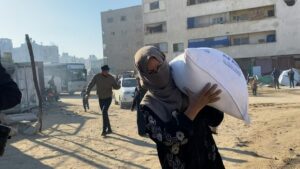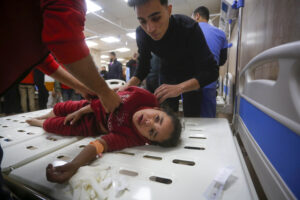‘Australia’s credibility, reputation at stake in Afghan war crimes case against ex-soldier’
ISTANBUL (AA): An Australian judge delivered a landmark ruling last week that shook the country and the wider world.
Federal Court Judge Anthony Besanko ruled against Ben Roberts-Smith, the country’s most decorated soldier, in his defamation case against three newspapers and journalists.
Roberts-Smith had sued The Sydney Morning Herald, The Age and The Canberra Times, along with journalists Nick McKenzie, Chris Masters and David Wroe, for reports that said he was involved in the killings of multiple unarmed civilians in Afghanistan.
The judge ruled that there was “substantial truth” in the reports, which included an incident in which Roberts-Smith kicked an Afghan man off a cliff and then ordered soldiers to shoot him.
Besanko found that the soldier was “complicit in and responsible for the murder” and that the reports “established the contextual truth of imputations linked to allegations of bullying and domestic violence.”
With the civil case thrown out, the focus is on whether Roberts-Smith, a recipient of Australia’s highest military honor, the Victoria Cross, will face criminal charges.
For Ben Saul, the Challis Chair of International Law at the University of Sydney, Australia’s “legitimacy” and “credibility” hangs in the balance.
“Our legitimacy, our credibility, in advocating for human rights globally, depends on us doing the right thing,” Saul shared in an interview.
“Australia must demonstrate that it respects human rights itself … what you’d hope all countries would do when faced with allegations of war crimes by their own people.”
He pointed out that charges against Roberts-Smith “will be the first war crimes prosecution of any Australian soldier in modern Australian history.”
Australia is concerned about doing the right thing for a few reasons, according to Saul, who is also an associate fellow of Chatham House in London and the International Center for Counter-Terrorism in The Hague.
“Morally, it’s the right thing to do. Legally, we have an obligation to prosecute international crimes,” he explained.
Australia is part of the International Criminal Court “so we must genuinely prosecute our crimes in order to avoid the international court,” he added.
“Looking at these crimes, and potentially considering prosecutions, it’s also important for Australia’s international reputation, and most of all, for the effectiveness and discipline of the Australian military itself,” said Saul.
What next?
The first thing the Australian government should do is “compensate the Afghan victims because they have been waiting over a decade,” said Saul.
“These are people who are deeply traumatized by the murders of their family members, and who have been impoverished by those murders because often the breadwinner in those families was killed,” he said.
“We’ve known about those murders for so long. We have the capacity to make those payments. We’ve had a court finding that those murders have been committed. And still, we’re not providing compensation.”
Saul said the civil case against Roberts-Smith was “important because many witnesses were called, including other Australian soldiers who testified that he had committed murder.”
“And those are some of the same witnesses that you would expect to appear in a criminal prosecution if charges are laid,” he said.
“For a criminal case, the standard of proof is higher than in a civil defamation case. The prosecution has to show that war crimes were committed beyond a reasonable doubt. So, it is a much higher bar to meet.”
Saul explained that the Australian government is also investigating “a whole series of allegations of up to 40 murders by Australian soldiers in Afghanistan over the past decade or so.”
The Office of the Special Investigator was established after the release of the Brereton Report in late 2020, which found “credible evidence” that Australian soldiers murdered civilians and prisoners in Afghanistan.
Australia’s human rights records
“We don’t always do the right thing, like every country. I think it’s well known that our treatment of asylum seekers and refugees still today falls beneath international legal standards. Likewise, our treatment of Australia’s Indigenous peoples does not meet international human rights standards. So, there’s always more work to be done.”
In Roberts-Smith’s case, there is now an important question whether his Victoria Cross “should be canceled by the Australian government,” said Saul, stressing that the case represents “an opportunity to educate the Australian public … about the laws of war and the importance of respecting them and not murdering prisoners under your control.”
Western allies not on the same page
Australia is not alone in facing such accusations, with many “very serious” allegations also made against UK and US forces in places like Afghanistan and Iraq, according to Saul.
However, he said “very few people have been seriously held accountable through criminal prosecutions.”
“It is disappointing that some of Australia’s closest allies in the West have not taken seriously enough their responsibility to bring to justice the perpetrators of international crimes,” said Saul.
The war crimes probe in Australia could hinder “effective military cooperation” with its Western allies, he added.










